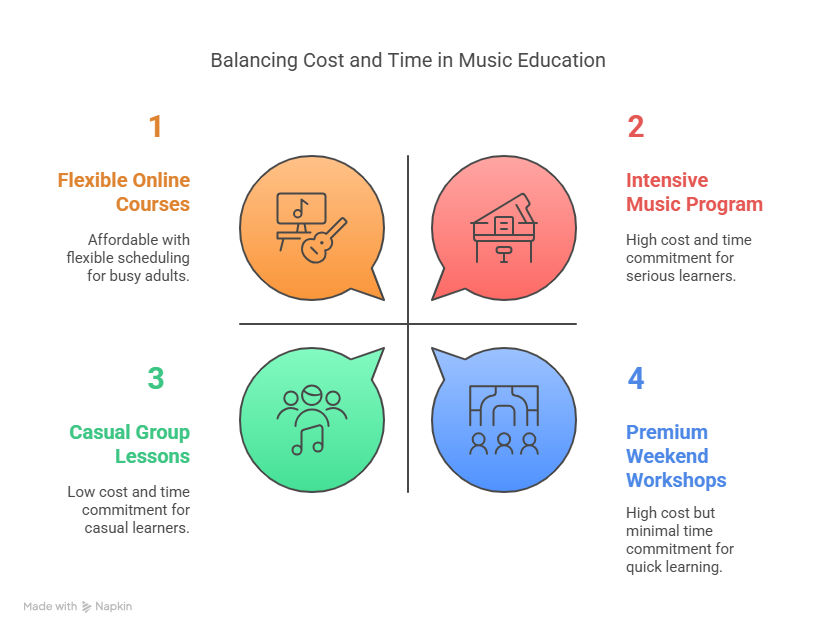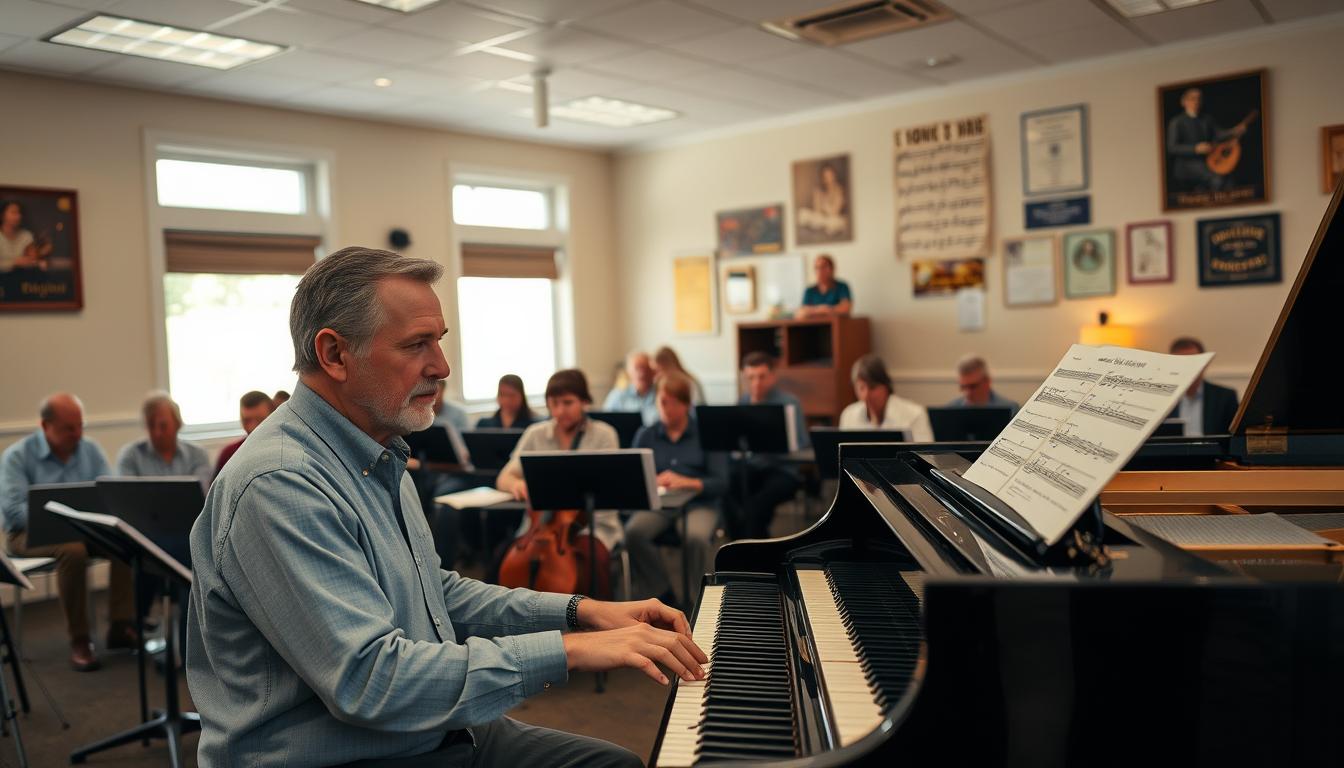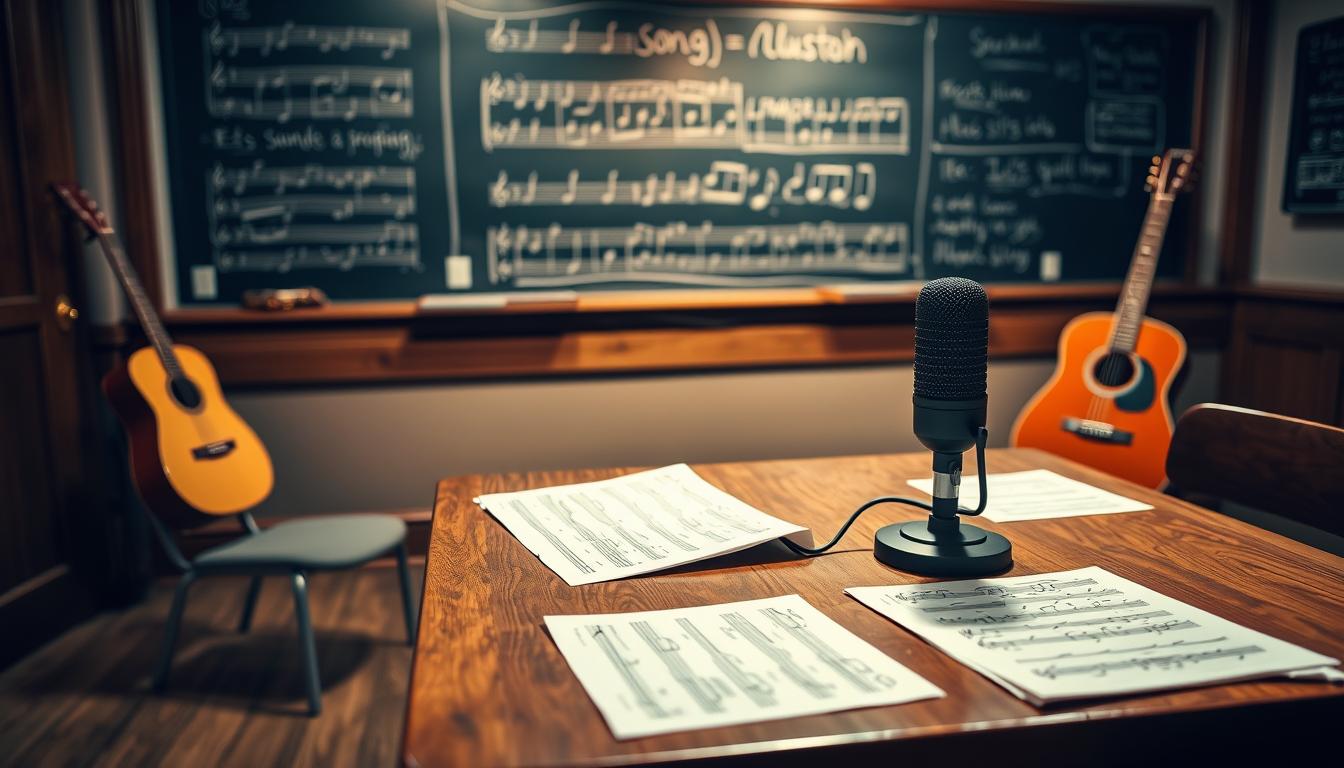Music Schools for Adults show that it’s never too late to discover the joy of learning music. Many people assume that musical education is only for the young, but this couldn’t be further from the truth. Adult music education is on the rise, offering a new hobby, a creative outlet, and a chance to challenge oneself.
Whether you’re looking to revisit a childhood passion or start something entirely new, music classes for grown-ups provide a supportive environment to explore your musical interests. With flexible schedules and tailored instruction, it’s easier than ever to fit music learning into your busy life.
Embracing adult music education can be a rewarding experience, offering not just the chance to learn a new skill, but also to connect with like-minded individuals and enhance your overall well-being.
Why It’s Never Too Late to Start Your Musical Journey
Learning music as an adult opens doors to new experiences and personal growth. Many individuals believe that musical education is only for the young, but this couldn’t be further from the truth. Adult music lessons can be a transformative experience, offering a unique blend of cognitive, emotional, and social benefits.
Cognitive and Emotional Benefits of Adult Music Education
Engaging in music learning for adults has been shown to have numerous cognitive benefits, including improved memory, concentration, and spatial-temporal skills. Moreover, the process of learning music can be therapeutic, reducing stress and anxiety while boosting self-esteem and confidence.
The emotional benefits of music education for adults should not be underestimated. Creating music can be a powerful outlet for expression and emotion, providing a sense of accomplishment and pride in one’s abilities.
| Benefits | Description | Impact |
|---|---|---|
| Cognitive Improvement | Enhances memory, concentration, and spatial-temporal skills | Improved cognitive function |
| Emotional Well-being | Reduces stress and anxiety, boosts self-esteem | Better mental health |
| Social Connections | Opportunities to meet new people through music groups or classes | Expanded social network |
Debunking Age-Related Myths About Learning Music
One of the most pervasive myths about learning music is that it’s too late to start as an adult. However, many successful musicians began their journeys later in life. With the right mindset and instruction, adults can make rapid progress and enjoy the many rewards of music making.
It’s also worth noting that adults often bring a different set of skills and motivations to music learning, such as discipline and a clear understanding of their goals. This can sometimes give them an edge over younger learners.
By choosing to start adult music lessons, individuals can take the first step towards a more fulfilling and creative life. Whether it’s to explore a new hobby, enhance cognitive function, or simply for the joy of making music, the benefits of music education for adults are undeniable.
Choosing the Right Music School for Adults
The journey to finding the perfect music school for adults involves considering various crucial elements. Adults seeking music education have diverse needs and preferences, making it essential to choose a music school that caters to these individual requirements.
Traditional vs. Online Music Learning Options
One of the primary decisions adults face is whether to opt for traditional in-person music lessons or online music learning platforms. Traditional music schools offer face-to-face interaction with instructors, which can be beneficial for those who value personal feedback and social interaction. On the other hand, online music learning provides flexibility and convenience, allowing adults to learn from the comfort of their own homes and at their own pace.

Online platforms often include a wide range of resources, such as video tutorials, interactive exercises, and virtual communities, which can enhance the learning experience. However, they require a certain level of self-motivation and discipline. Ultimately, the choice between traditional and online music learning depends on an individual’s learning style, schedule, and personal preferences.
Cost Considerations and Time Commitments

Another critical aspect to consider is the cost associated with music education. Adults should evaluate the cost of music workshops for adults and compare it with their budget. Additionally, the time commitment required for music training is a significant factor. Adults with busy schedules need to find programs that offer flexible scheduling to accommodate their lifestyle.
- Evaluate the cost of different music schools and programs.
- Consider the time required for lessons and practice.
- Look for programs that offer flexible scheduling.
Finding Programs That Cater to Adult Learning Styles
Music education for mature learners should be tailored to their learning styles and goals. Adults should look for music schools that offer programs specifically designed for adult learners, focusing on their interests and skill levels. These programs can provide a supportive environment where adults feel comfortable learning alongside others with similar goals and challenges.
By considering these factors, adults can make an informed decision when selecting a music school that meets their needs, ensuring a rewarding and enjoyable musical journey.
Taking the First Step: How to Begin Your Musical Journey Today
Embarking on a musical journey as an adult can be a life-enriching experience. To get started, consider enrolling in a music school for adults that offers adult music lessons tailored to your needs and schedule.
Begin by selecting an instrument that resonates with you, whether it’s the piano, guitar, or violin. Research local music classes for grown-ups or online platforms that provide flexible learning options. Finding the right teacher is crucial; look for someone with experience in teaching adults and a teaching style that suits your learning preferences.
Setting achievable goals will help you stay motivated. Start with short practice sessions and gradually increase the duration as you become more comfortable. With consistent practice and the right guidance, you’ll be making music in no time. Take the first step today and discover the joy of music-making.
FAQ
What types of music classes are available for adults?
Adults can choose from a variety of music classes, including private lessons, group classes, and workshops. Many music schools for adults offer classes in different instruments, such as piano, guitar, violin, and voice. Some schools also provide classes in music theory, composition, and music production.
Are online music lessons as effective as traditional in-person lessons?
Online music lessons can be just as effective as traditional in-person lessons, especially with the advancement of technology. Many adult music students prefer online lessons due to their flexibility and convenience. However, some students may still prefer the personal interaction of in-person lessons.
How much do adult music lessons typically cost?
The cost of adult music lessons varies depending on factors such as the type of lesson, the experience of the teacher, and the location. On average, private lessons can range from $30 to $100 per hour, while group classes may be more affordable, often between $10 to $30 per session.
Do I need to have prior musical experience to join a music school for adults?
No, prior musical experience is not necessary to join a music school for adults. Many music schools cater specifically to adult beginners, offering classes and lessons designed to introduce the basics of music and instrument playing.
How much time do I need to commit to learning music as an adult?
The amount of time needed to commit to learning music varies depending on individual goals and the type of lessons. Generally, setting aside 15-30 minutes per day for practice is a good starting point. Some adult music students may choose to dedicate more time, while others may prefer a more relaxed schedule.
Can I learn music theory as an adult, or is it too late?
It’s never too late to learn music theory as an adult. Understanding music theory can enhance your musical experience, whether you’re playing an instrument or singing. Many music schools for adults offer music theory classes tailored to adult learners.
What are the benefits of adult music education for cognitive function?
Research has shown that learning music as an adult can have numerous cognitive benefits, including improved memory, concentration, and spatial-temporal skills. Engaging in music activities can also help to reduce the risk of age-related cognitive decline.
How do I find the right music teacher or instructor for my needs?
To find the right music teacher, consider factors such as their experience, teaching style, and qualifications. You can also ask for referrals from friends, family, or other music students. Many music schools for adults offer trial lessons or introductory sessions to help you find the right fit.
Are there music workshops or classes specifically designed for adult learners?
Yes, many music schools and organizations offer music workshops and classes specifically designed for adult learners. These may include workshops on specific instruments, genres, or techniques, as well as classes focused on music appreciation and history.




